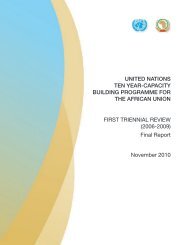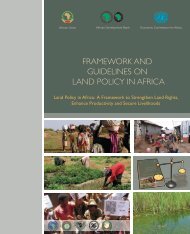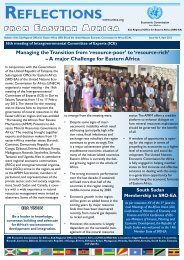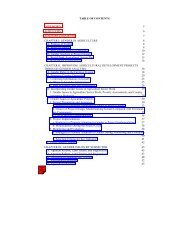A Decade of NEPAD - Economic Commission for Africa - uneca
A Decade of NEPAD - Economic Commission for Africa - uneca
A Decade of NEPAD - Economic Commission for Africa - uneca
Create successful ePaper yourself
Turn your PDF publications into a flip-book with our unique Google optimized e-Paper software.
22 A <strong>Decade</strong> <strong>of</strong> <strong>NEPAD</strong>: Deepening <strong>Africa</strong>n Private Sector and Civil Society Ownership and Partnership<br />
However, most <strong>of</strong> the Bank’s assistance to support <strong>NEPAD</strong><br />
focused on the funding <strong>of</strong> infrastructure projects. Through<br />
2005, 11 regional projects (including three in the financial<br />
sector, one <strong>for</strong> trade facilitation, three related to HIV/AIDs,<br />
and three in the power sector) valued at US$555 million<br />
had received finance commitments.<br />
From 2006 to 2007 the Bank committed another US$278.6<br />
million in financial support to promote <strong>NEPAD</strong> regional<br />
infrastructure projects, including: the West and Central<br />
<strong>Africa</strong> Air Transport Safety Project, the Senegal River<br />
Basin Multipurpose Water Development Project, and the<br />
West <strong>Africa</strong> Power Pool.<br />
Simultaneously the Bank helped develop a pipeline <strong>of</strong><br />
strong infrastructure projects valued at roughly US$ 1.7<br />
billion in transport, trade, energy, water, telecoms, the<br />
financial sector and agriculture <strong>for</strong> funding in the period<br />
2007 – 2009. Six projects worth $915 million were scheduled<br />
<strong>for</strong> Board Approval, including: a) supporting the<br />
implementation <strong>of</strong> the STAP priorities (regional transport<br />
and trade facilitation projects in Central <strong>Africa</strong>, Regional<br />
Communications Infrastructure Program in East and<br />
Southern <strong>Africa</strong>, the Second Phase <strong>of</strong> the Southern <strong>Africa</strong><br />
Power Pool project, and grid interconnection between<br />
Ethiopia and Sudan; the implementation <strong>of</strong> the CAADP<br />
in West <strong>Africa</strong> (West <strong>Africa</strong> Agriculture Productivity<br />
Program) and the management <strong>of</strong> water resources at basin<br />
level (Niger River Basin).<br />
Several regional diagnostic studies were also carried out to<br />
undertake gap analyses <strong>of</strong> <strong>Africa</strong>n regional infrastructure<br />
(trade corridors, regional power systems and international<br />
communications links). The Bank continued to support<br />
REC development providing capacity development resources<br />
to: the Southern <strong>Africa</strong> Development Community<br />
(SADC), the Common Market <strong>of</strong> East and Southern <strong>Africa</strong><br />
(COMESA), the <strong>Economic</strong> Community <strong>of</strong> West <strong>Africa</strong>n<br />
States (ECOWAS), the Union Economique et Monitaire<br />
Ouest <strong>Africa</strong>ine (West <strong>Africa</strong>n Monetary Union)(UE-<br />
MOA), Communauté Économique des États d’Afrique<br />
Centrale (<strong>Economic</strong> Community <strong>of</strong> Central <strong>Africa</strong>n States)<br />
(ECCAS) and the East <strong>Africa</strong>n Community (EAC). 20<br />
The Bank has approved US$700 million <strong>for</strong> <strong>NEPAD</strong><br />
programmes and priorities in FY 2009 supporting eight<br />
20 World Bank, Support to <strong>NEPAD</strong> Period <strong>of</strong> Report: July 2006 to<br />
June 2007<br />
priority projects in energy, ICT, transport, water and agriculture.<br />
Support has also been provided <strong>for</strong> the development<br />
<strong>of</strong> the COMESA and ECOWAS Infrastructure<br />
funds, regional trade integration assessments, mineral<br />
production studies and a multi-sector investment in the<br />
Zambezi Basin. In addition, the Bank administers a donor<br />
trust fund <strong>for</strong> CAADP. 21<br />
In support <strong>of</strong> the private sector and with support from<br />
a fairly broad group <strong>of</strong> other multilateral and bilateral<br />
donors, the World Bank’s International Finance Corporation<br />
agreed to serve as the host <strong>of</strong> the Private Enterprise<br />
Partnership <strong>Africa</strong> (PEP-<strong>Africa</strong>) initiative with the key<br />
aim <strong>of</strong> integrating and harmonising donor funded private<br />
sector and SME support programmes across the continent.<br />
Building upon the achievements <strong>of</strong> the <strong>Africa</strong> Project<br />
Development Facility, PEP-<strong>Africa</strong> was established with<br />
the following three objectives: 1) improving the enabling<br />
business environment <strong>for</strong> private sector growth and development,<br />
2) strengthening the growth and competitiveness<br />
<strong>of</strong> SMEs, and 3) stimulating private sector related<br />
investment. Key programmes <strong>of</strong> PEP-<strong>Africa</strong> involve the<br />
provision <strong>of</strong> advisory services to <strong>Africa</strong>n governments<br />
in relation to private enterprise development, providing<br />
capacity building services to “business development<br />
service providers” across the continent and to financial<br />
institutions serving SMEs. 22<br />
The World Bank is also a lead partner in the Public-Private<br />
Infrastructure Advisory Facility (PPIAF) 23 that was<br />
launched in 1999 as a joint initiative <strong>of</strong> Japan and the UK<br />
working closely with the Bank. It was based on the Bank’s<br />
Infrastructure Action Program and its mission is to help<br />
eliminate poverty and achieve sustainable development<br />
through public-private partnerships (PPPs). Toward this<br />
end, the PPIAF <strong>of</strong>fers technical assistance to countries to<br />
support public-private project development and it identifies<br />
and shares best practice around public-private partnership<br />
related infrastructure project development in developing<br />
countries. Through grants, the PPIAF finances a range <strong>of</strong><br />
country specific and multi-country advisory and related<br />
services.<br />
21 World Bank, Support to <strong>NEPAD</strong> Period <strong>of</strong> Report July 2008 to June<br />
2009<br />
22 UNECA (2009) The Role <strong>of</strong> the Private Sector and Civil Society:<br />
Review <strong>of</strong> <strong>NEPAD</strong> after 8 Years, November 2009, p. 24<br />
23 www.ppiaf.org – PPIAF’s Mission and Governance







